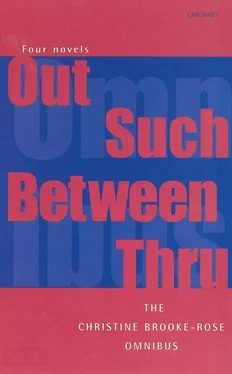The wind, which does not have the rhythms of either Strength or anguish, rattles the shack’s corrugated iron roof. The rain shimmies down the small high window, a long way from the mattress on the floor. In the dark the four raised knees make a table mountain under the army blanket. The condition is not one of priapism. In action, it might perhaps be sufficient to imagine a face the colour of irrigated earth lying there instead, beautiful in any circumstances, the eyes white slits, the nucleus half gone into half consciousness, the nostrils flat and far apart, the wide lips mauve with pink and white between, the dark breasts high and lively to the hand. In absolute immobility however, it is enough merely to evoke the gestures of the past, which does not exist save in the privacy of concupiscence. The four raised knees beneath the army blanket are dark and presumably bare of flies, the two bodies placid under the tent, the male to the left, the female to the right. Limply the right hand of the male holds the left hand of the female. The outer hands lie quietly alongside.
— Lilly you start. I need you so.
— Do you remember when you were the hospital porter, how you used to come into the women’s ward to collect and deliver the letters? Twice a day you’d come.
— Yes, yes, go on.
— And you’d call out, any letters for posting, and the women would call back from various beds, usually the same beds every day, but sometimes there’d be a shy voice from a different bed.
— Yes, yes. And what else did I say?
— You’d walk up one side of the ward, handing out the mail, and collecting any for postage, and you’d call out, anyone want a jelly-baby? And some would call back yes, and others would be silent, some too ill to care, some unconscious maybe. And you’d walk up the other side of the ward, handing out more mail, and collecting any for postage, and you’d call out, anyone want a jelly-baby? And some would call back yes, and you’d go up to the bed and give them one out of a crumpled paper bag which had been in your trouser pocket. You held it in your left hand, with the letters still to be delivered between the index and third finger, and you took out the jelly-baby with the thumb and same two fingers of your right hand and gave it to them. The letters to be posted went into your right hand coat pocket.
— Yes, yes. Go on.
— You were very popular. The women would call out yes George I want one, and here George, I’ve got a letter, and oh thank you George I knew you’d bring me some good news.
— And what did the sister say?
— The sister said any man who comes into a women’s ward every day offering jelly-babies out of a paper bag needs medical attention.
— Oh-ah, that’s good, that’s wonderful.
— That’s how we met.
— Go on.
— You’re forgetting me. Tickle my memory a little too.
— Do you remember how impressed I was when I first took you out and found you were such a good mimic? You mimicked the women in the ward at 5 a.m. over their early morning tea. Please do it again, please do it again.
— Well. That’s a nice cup o’ tea this morning — Eh? — I said, that’s a nice cup of tea this morning. — Oh. Yes, it is nice, isn’t it? — Not like yesterday — Eh? — I said not like yesterday. Yesterday was terrible. If I’d have shut my eyes I’d’ve thought it was hot water (long silence). That wasn’t yesterday, that was the day before. Yesterday’s wasn’t too bad. — Eh? — I said, that wasn’t yesterday mornin’ the tea was like hot water, it was the day before. Yesterday’s was all right-Oh was it? Well this one’s real good tea. It’s a pleasure to drink it. — Eh? — I said this one’s real good tea anyway — Oh. Yes, it’s a lovely cup of tea. And you said –
— I think you’re wonderful.
— And I said what’s your name and you said Bill to you. And I said call me Lilly.
— Go on.
— And one day you came into the ward as usual and you went up to Granny Grumble and she said raise me Charlie I’ve slid right down and the nurses don’t know how and don’t pay no attention to me anyways. And it’s true the nurses just weren’t strong enough they had to raise us in bits and she always yelled with pain or pretended to be. And you put down your letters and your paper bag on the edge of the bed and you crooked your two hands under her armpits from the back and raised her swift and sharp and she cried oooh! how lovely in eighty-year-old ecstasy.
— Aaaah. Go on.
— No, you go on.
— Do you remember that nasty nurse you disliked so much, from Trinidad she was and one day she came out in a loud voice with Everyone says the patients in Ward Fourteen are impossible.
— And this was greeted with a stony silence and I was killing her with a look, she was near me you see so she said Oh, I don’t mean you. And I said no dear you mean the plants.
The laugh is that of a delighted child.
— Go on.
— No, you titillate me now.
— Do you remember how impressed I was when I took you out the second time and you knew so much about it all? We were travelling by tube and you said to me, do you know, you had to shout in my ear because of the noise, but of course nobody heard, despite the crowd, you said, do you know, out of all these people you see every day travelling on the tube twelve and a half per cent have a permanent colostomy. And I said, what did I say?
— You said, oh you really seized the opportunity, it was such clever repartee, you pressed against me with the weight of the whole crowd on you as the train jolted round the bends, and you murmured in my ear, or shouted maybe, my beloved put his hand by the hole of the door and my bowels were moved for him.
— And despite the noise you heard it and blushed furiously and laughed to cover it and shouted back into my ear I am black but comely which of course wasn’t true and the train screeched to a stop.
— Don’t stop, don’t stop.
— Aaaah.
— Go on, go on.
— Do you remember an inn Miranda do you remember an inn and the tedding and the spreading of the straw for a bedding and the fleas that tease in the high Pyrenees do you remember an inn.
— I remember I remember the house where I was born the little window where the sun came peeping in at mor-or-or-orn.
The wind which has the rhythms of identity rattles the shack’s corrugated iron roof. The rain shimmies down the small high window, a long way from the mattress on the floor. The four raised knees make a table mountain under the army blanket, the two bodies placid in the tabernacle, the male to the left, the female to the right reflecting the sensory observations as the moon reflects the sun. Memory has occurred, in a state of comatose suspension. Limply the right hand of the male holds the left hand of the female, the two outer hands lie quietly alongside. The squint is not visible in this position, nor would it be in any other, except as preformed knowledge peering through the blackness. But look at the closed eyelids they are the right colour. The wind which has the rhythms of completed union rattles the shack’s corrugated iron roof. The rain shimmies down the small high window.
— Listen, they’re playing our tune.
Sooner or later some interruption will be inevitable, an itch to scratch or a bladder to go and empty or sleep perhaps and some disallowable dream. But now there is only immobility. Everything that moves increases risk.
— You haven’t been bringing me my gruel in here for some time, have you?
— No, that’s true.
— Goodnight.
— Goodnight.
During the hammering the conversation takes the form of the hammering, which has the high-pitched ring of metal hammer on metal chisel. Lost high-pitched words lurch suddenly into a lower key whenever the hammering stops.
Читать дальше












